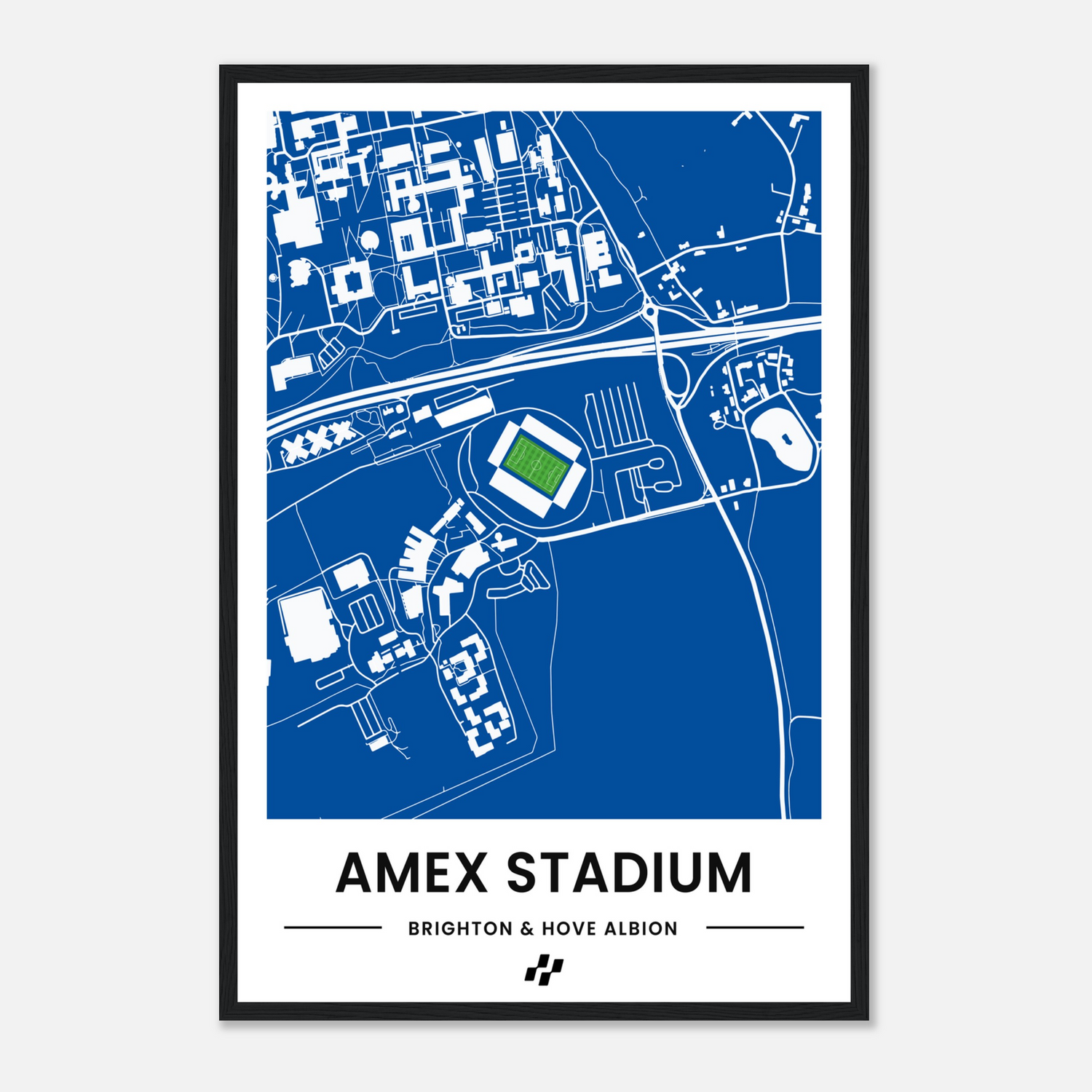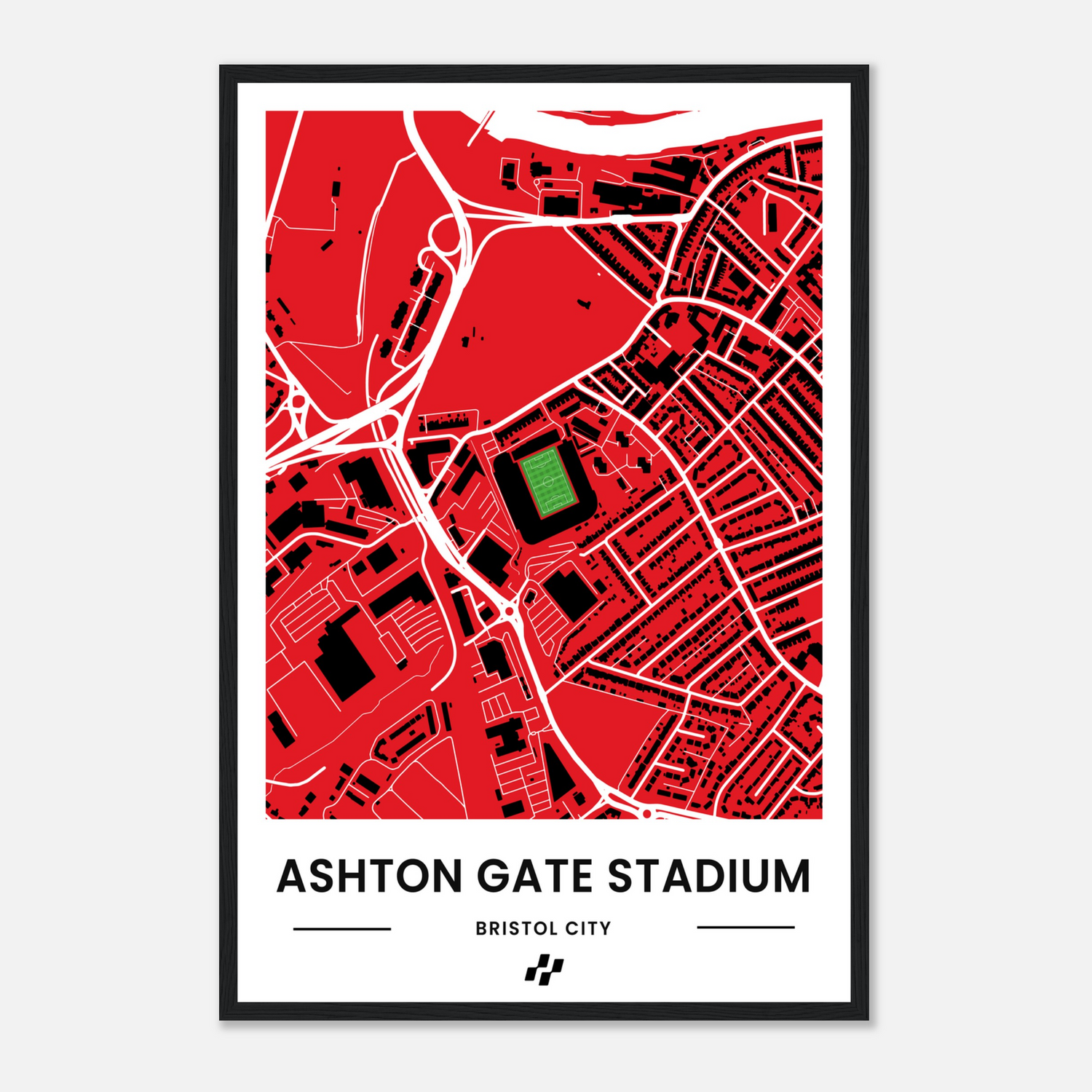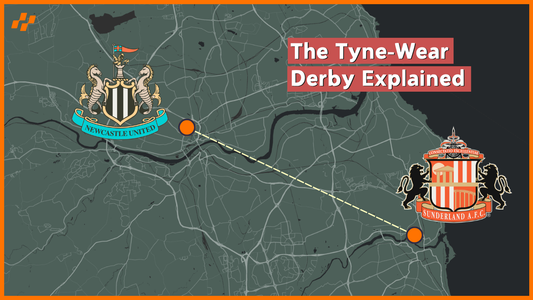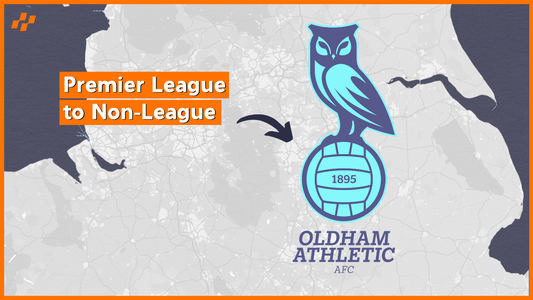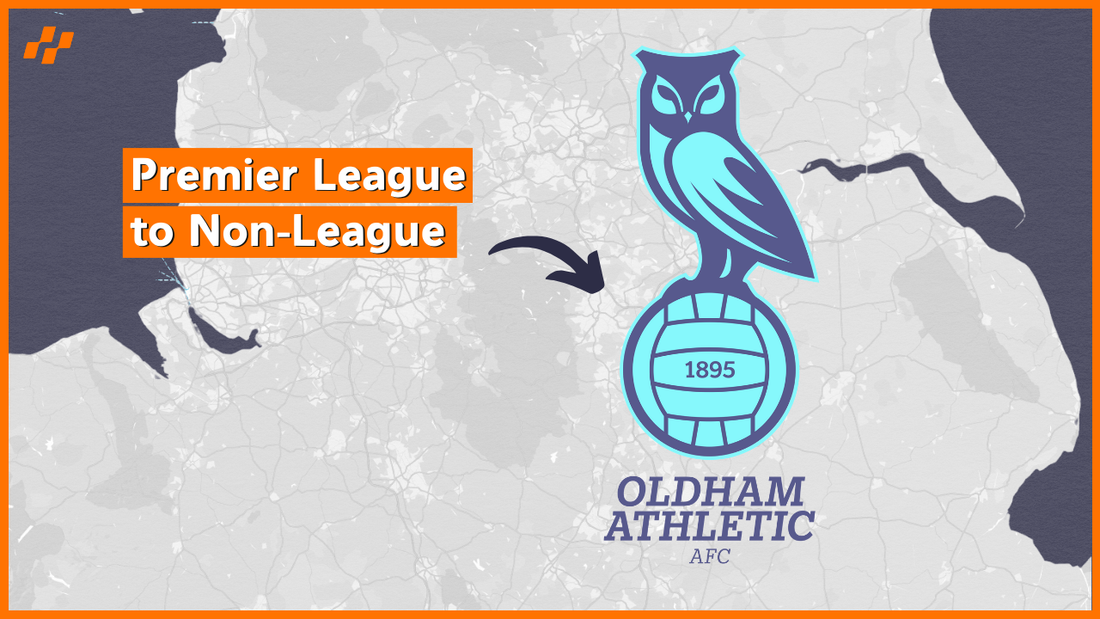
From Premier League Founders to Non-League: The Oldham Athletic Story
Share
It's 1992, and you're watching the very first Premier League season. Manchester United, Liverpool, Arsenal... and Oldham Athletic? That's right, little Oldham Athletic from Greater Manchester were there at the birth of the Premier League, taking on England's giants and actually beating them.
Fast forward thirty years, and they became the first former Premier League club to drop out of the Football League entirely.
This is the story of one of football's most dramatic falls from grace, a tale that's got everything: cup final heartbreak, financial meltdowns, owner mismanagements, fan protests, and a pitch invasion that stopped a match with twelve minutes to go.
In this video, we delve into how Oldham went from the Premier League to non-league in three decades. But this story, may just have a happier ending.
Watch the full video on our YouTube Channel
CLUB ORIGINS AND EARLY HISTORY
But before we dive in, let's set the scene with a bit of history. Oldham Athletic Football Club was founded in 1895 as Pine Villa, before changing their name to Oldham Athletic in 1899 when nearby team, Oldham County folded.
Unlike many clubs, Oldham Athletic gained quick success and gained acceptance into the Football League in 1907–08. They've been kicking around for well over a century, making them one of England's older professional clubs.
For most of their existence, they were a typical lower-league side, the kind of club that formed the backbone of English football without ever threatening the big boys.
They spent decades bouncing between the second and fourth tiers of the football league system, occasionally having a decent cup run but mostly just existing in football's comfortable middle ground.
Their home, Boundary Park, opened in 1899, proper old-school football ground with character. For the best part of a century, Oldham were exactly what you'd expect: a working-class club serving a working-class town.
That all changed in the 1980s when a certain Joe Royle arrived and decided to rewrite the history books.
THE GLORY DAYS
In June 1982, Joe Royle became manager. His team finished 7th in the second division in his first season but dropped to 19th in his second. In 1986-87, Oldham narrowly missed First Division promotion, finishing three points behind Portsmouth and losing the inaugural play-offs to Leeds United.
In 1990, they reached the League Cup final. Narrowly losing 1-0 to Nottingham Forest. A year later, they earned promotion to the top flight by winning the second division, ending a 68-year absence. Sixty-eight years! Some fans had literally never seen their team in the top division.
Then came 1992 and the birth of the Premier League. Twenty-two founding members, and Oldham Athletic were one of them. Not just there to make up the numbers either – they were taking scalps left, right, and center. Manchester United, Liverpool, Chelsea, Tottenham, all fell to the Latics in that inaugural season
But the real heartbreaker came in 1994. FA Cup semi-final against Manchester United at Wembley. With one minute left on the clock, Oldham were leading 1-0. One minute away from an FA Cup final.
Then Mark Hughes scored an equaliser. The replay was a different story, United won 4-1. That's football for you – sometimes cruel, always dramatic.
THE BEGINNING OF THE END
Here's where the story takes a darker turn. That FA Cup semi-final heartbreak seemed to break something in the team.
Their league form collapsed, and on the final day of the 1993-94 season, they needed to beat Norwich City to stay up. They didn't. After three years in the Premier League, Oldham Athletic were relegated.
Joe Royle, the man who'd built this dream, left in late 1994. It's like losing your dad when you're still a kid, suddenly, everything felt uncertain.
Graeme Sharp came in as player-manager, but he couldn't stop the slide. By the end of the 1996-97 season, just three years after there Premier League relegation, Oldham suffered another drop, tumbling into the third tier just after Sharp had resigned to be succeeded by Neil Warnock.
The managerial merry-go-round started spinning. Neil Warnock had a go, but even his no-nonsense approach couldn't work miracles. The club that had once traded blows with Manchester United was now struggling to find its identity in the lower leagues, Oldham would ultimately stay in the third tier for 21 years.
FINANCIAL MELTDOWN
If you thought relegation was bad, wait until you hear about the early 2000s. Enter Chris Moore, a businessman who bought the club in 2001 with grand promises.
Five years to get back to the Premier League, he said. Under manager Iain Dowie, things looked promising – they reached the Division Two playoffs in 2002-03.
Then Moore pulled the rug out from under everyone. Just like that, his backing disappeared. He sold off the club's best players at bargain prices and left Oldham with massive debts.
Iain Dowie publicly accused Moore of bringing the club "to their knees" – and he wasn't wrong.
By August 2003, Oldham Athletic were in administration and was reportedly close to folding.
The tax man was knocking, wages weren't being paid, and the club had until the end of September to find £1.2 million or face liquidation. Liquidation! We're talking about a former Premier League club now facing extinction.
Step forward the "Three Amigos", Simon Blitz, Simon Corney, and Danny Gazal. These three businessmen formed a rescue consortium and pulled Oldham back from the brink in 2004. They even bought Boundary Park stadium through their company Brass Bank to secure the club's future.
THE WILDERNESS YEARS
What followed was over a decade of stagnation in League One. A club that's stuck in neutral for fifteen years, that's what Oldham fans endured.
The financial constraints after administration were brutal. Managers were working with shoestring budgets, relying on free transfers and hoping for miracles.
There were occasional bright spots. John Sheridan got them to the playoffs in 2006-07, only to fall short against Blackpool.
In 2013, they pulled off a giant-killing act, beating Liverpool in the FA Cup. But these moments of joy were becoming rarer and rarer.
The managerial revolving door kept spinning. Joe Royle returned briefly, then Dave Penney, then Paul Dickov. It was like watching your favorite TV show get cancelled and replaced with increasingly poor sequels.
By 2018, Oldham hadn't finished in the top half of any division since 2009. Under Richie Wellens, they were relegated from League One to League Two – their first time in the fourth tier since 1971. The slide was accelerating.
THE LEMSAGAM NIGHTMARE
Just when you thought it couldn't get worse, enter Abdallah Lemsagam. This Dubai-based Moroccan former football agent bought 97% of the club in January 2018, while the Supporters' Trust maintained a 3% stake. What followed was four and a half years of absolute chaos.
Ten managers in less than five years. Paul Scholes, Manchester United legend, tried his hand and lasted 31 days before quitting, citing broken promises. Laurent Banide managed 11 games. Harry Kewell, the former Australia internatioal, got seven months before the axe fell.
The problem wasn't just the constant changes, it was the interference. Reports suggested Lemsagam and his brother Mohamed were meddling in transfers and team selection, undermining every manager who walked through the door. Richie Wellens later said the situation made the job "impossible."
Financially, things were even worse. Late wages became the norm. Players were threatening strike action. HMRC hit them with winding-up petitions over unpaid taxes.
In March 2020, former owner Simon Blitz tried to put the club into administration over unpaid debts, that would have meant a 12-point deduction and likely relegation.
The stadium situation was farcical too. The North Stand that Blitz's company had built kept getting closed due to disputes over rent and safety. The Joe Royle Stand, named after the club's greatest manager, sitting empty because the owner couldn't get along with the landlord.
On the pitch, results matched the chaos off it. Nineteenth in 2019-20, eighteenth in 2020-21, then 23rd in 2021-22. The fans had seen enough.
FAN REVOLT AND THE FINAL STRAW
The supporters' patience finally snapped. The Push The Boundary action group had been warning about this for years, but now the protests escalated. Tennis balls thrown onto the pitch, whistles blown to confuse players and officials, desperate measures from desperate fans.
In December 2021, the club banned three lifelong supporters for voicing their "dislike" of the regime. One had called the club a "dictatorship" – and honestly, can you blame them? The backlash was so intense that the bans were overturned within two days.
One fan even dressed as the Grim Reaper and paraded a coffin at a March 2022 match. A symbolic funeral for their beloved club. Dark humor, but it captured the mood perfectly.
Then came April 23rd, 2022. Oldham versus Salford City at Boundary Park. Oldham were losing 2-1, relegation to non-league was confirmed, and 115 years of Football League membership was about to end.
In the 79th minute, hundreds of furious fans invaded the pitch, unfurling a massive banner: "GET OUT OF OUR CLUB."
The referee took the players off for their safety. After the stadium was cleared, the final twelve minutes were played behind closed doors. When that final whistle blew, Oldham Athletic became the first former Premier League club to drop out of the Football League entirely.
REDEMPTION AND HOPE
The nightmare finally ended in July 2022 when Frank Rothwell, a lifelong Oldham fan and local businessman, bought the club from Lemsagam. Real Oldham people, back in charge of their club.
Rothwell's first priority was reuniting the club with its stadium, buying Boundary Park from Blitz's company. By March 2023, Oldham Athletic owned their home again. It sounds simple, but for these fans, it was everything.
John Sheridan, who'd returned for his sixth stint as manager in that doomed final season, stayed on to begin the National League campaign before stepping down in September 2022. The fans gave him a hero's send-off, respect for a man who'd tried everything to save their club.
RETURN TO THE FOOTBALL LEAGUE
From Premier League founders to non-league in thirty years. It's a story that breaks your heart and puts football's problems into sharp focus. Mismanagement, financial chaos, disconnected owners – it's a cautionary tale for every football club.
But it's also a story about the power of supporters. Oldham fans never gave up. From the brink of bankruptcy in 2003 to the protests of 2022, they fought for their club. They wanted their club back, and eventually, they got it.
Oldham Athletic story however, is heading into a more positive direction. In the 2024-25 season, Oldham Athletic reached the National League play-off final after finishing 5th in the table. At Wembley on June 1, they faced Southend United in the National League play-off final.
Despite trailing in extra-time, substitutes James Norwood and Kian Harratt scored within two minutes to secure a dramatic 3-2 victory, ending the club's three-year absence from the English Football League.
The victory came before a record crowd of 52,115 at Wembley, marking a triumphant return to professional football for the Latics. Now Oldham Athletic and manager Micky Mellon and his staff face the challenge of building a squad for their return to the EFL.

